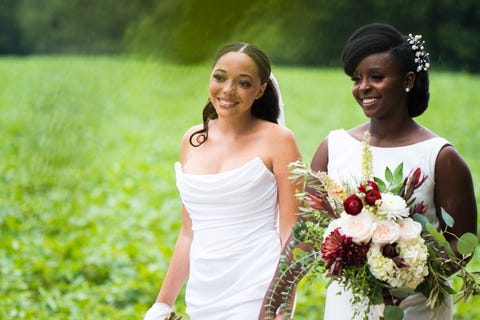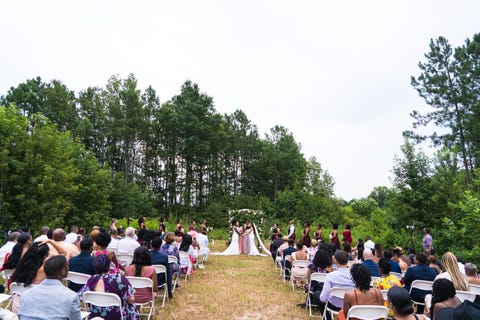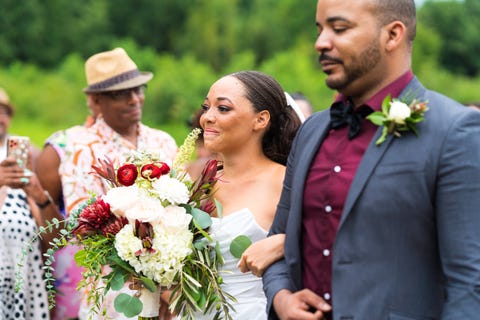Products You May Like
All of my childhood fantasies about marriage involved a church.
I was raised in a tongues-speaking, foot-stomping, choir-sanging, tambourine-playing Black church, where my grandparents—on both sides of my family—were pastors. I loved being a church girl—spending every Sunday in a wooden pew within the first five rows, the way my world revolved around the extra aunties and cousins I gained through this spiritual family. I envisioned that one day I’d walk up the large brown staircase of the main entrance, through the vestibule, and down the aisle toward my future husband. It’s where my mother and father were married more than three decades ago, and I always looked forward to kicking off my own happily ever after the same way.
But my real wedding in 2021 was nothing like what I’d pictured. For starters, the husband of my dreams was actually my wife, Mariah. I couldn’t have conjured up a better life partner and soulmate if I tried. But queerness was nowhere on my life bingo card growing up, so when I realized, just after graduating college, that I had feelings for one of my best friends, it altered everything.
Suddenly church, this place I loved, became a place of conflict. At my church, queerness wasn’t accepted and certainly not celebrated— that was made clear to me in both overt and subtle ways. But it was also the place where I celebrated Black History Month and sang spirituals. It was where my community organizing began, where I interacted with multiple generations of Black people, and where most of my close friends spent their time. For so long, my childhood and overall cultural identity were tied to the Black church. We like to say that “love wins,” but when choosing love, I didn’t know how much it would change me. For a while, I couldn’t make out the prize I had supposedly won.
So when it came time for Mariah and I to select a venue for our wedding ceremony and reception, we didn’t even entertain the idea of trading vows in a church. I worried: Would they consider our union sacrilegious? Would we be lectured by a presiding pastor who doesn’t “believe” in homosexuality? Would I feel affirmed and loved on the day, or would we be anxious about any last-minute backlash? It didn’t feel right to invite people to turn us down during what was otherwise the happiest day of our lives. Why put ourselves through the anguish of unrequited care?
Preparing for this next phase, I felt lonely for one of the first times in my life. My career was beginning to take off, and I’d actively worked toward the healthiest relationship I’d ever had. Yet a community that always felt like safety for me couldn’t, or wouldn’t, bear witness to the home we’d found in one another. Growing up, we were taught that God is love, so what did it mean that love’s earthly representatives didn’t find us worthy of binding ourselves in what was supposed to be a sanctuary and source of refuge? We were lucky to have amazing people in our lives who’d supported us from the very beginning, but in those early moments of being engaged, I was coming to the realization that the one thing I had craved for so much of my life might never be.
There was so much time we’d never get back—and so much disappointment still in store.
The thought of having to jump through hoops to find a church that felt culturally relevant and was willing to accept us made me reflect on all the hardships we faced just by being our authentic selves: The holidays we spent away from extended family. Our constant internal conflicts around religion. The never-ending need to educate loved ones. The friends and family who weren’t there when it mattered most. There was so much time we’d never get back—and so much disappointment still in store.
I may have drowned in that loneliness had it not been for the land—89 lush, green acres of Southern land that my paternal grandfather spent his pension and the final years of his life making possible. He affectionately dubbed it Baker Acres: a plot of land covered in thin, towering pine trees and roaming white-tailed deer with two sprawling freshwater lakes fed by a winding brook. It was to be a safe haven for any of his children or grandchildren. And less than a decade later, the Baker Acres became a refuge for my wife and I when we said “I do.” I can’t remember exactly when I first had the idea of getting married on my family’s land, but it was like having a song stuck in your head. Once I entertained the thought for even a moment, it felt like what I was always meant to do.
The family land freed me in more ways than one. There was no gatekeeper there to tell me that our love was too blasphemous or that the Lord’s house was too sacred. As Imani Perry wrote in her bestselling book South to America: “The trees don’t know your race or your gender identity or your sexuality. The trees don’t expel you for rumors or bigotries.” In fact, the hallowed ground modeled what love really was: the insistence upon blooming no matter the conditions. Over the years, this land has been home to many people; first, the Indigenous Lumbee people, followed by colonizers, and eventually, us Bakers. Through extractive agriculture, natural disasters, and over-yielding, the land never stopped being exactly who She had always been. In good times, the land offered bountiful harvests and a foundation for shelter. In bad times, the land listened and learned resilience. She welcomed Mariah and I without judgment, presenting us with a clean slate. As a queer Black couple, everything about it felt too good to turn down. With my grandmother’s blessing and my aunt’s support, we set to work planning our special day.
When Aug. 14, 2021, finally rolled around, I no longer felt alone. I was better at setting boundaries and unwilling to be phased by anyone who wasn’t there for the explicit purpose of celebrating our love. I cherished those who had traveled to be with us. I realized that the sacredness of the day wasn’t lost, and God didn’t need a building to make His presence known. I felt God through my mother and Auntie Tyra, who pulled me to the side, just before I got dressed for my big day, to share marital wisdom. I felt God when what should have realistically been a 90-degree day was cooled off by a rain that completely encircled the land—without more than a drizzle reaching our party’s plot. I felt God in my Uncle David, who walked me down the aisle and always affirmed that being Christian and being queer are not mutually exclusive.
As our sisters co-officiated the ceremony, I stared ahead at my bride, thankful. “How lucky am I,” I thought to myself, “that God saw it fit to send me a life partner and use this wedding as a reminder that church exists all around us.” I thought about my ancestors who were enslaved in this county and may have worked this land with their dirt-caked hands. I thought about the white men who tried to beat this land and Her stewards into submission but failed. I thought about what it meant to build a love strong enough to withstand not only the test of time but also fear—to be brave enough to find God and love everywhere I go.
In an 1996 article for Orion Magazine called “Touching the Earth,” bell hooks wrote:
For many years, and even now, generations of black folks who migrated north to escape life in the South, returned down home in search of a spiritual nourishment, a healing, that was fundamentally connected to reaffirming one’s connection to nature…When the earth is sacred to us, our bodies can also be sacred to us.
In this way, I’m grateful for every closed door that led my wife and I to the land. I haven’t looked back since.
Brea Baker is racial and gender justice activist working locally and nationally towards the liberation of all oppressed people with an emphasis on Black people and women. When not organizing, you can find her traveling the world, listening to Beyonce, or manifesting the life her ancestors deserved.



